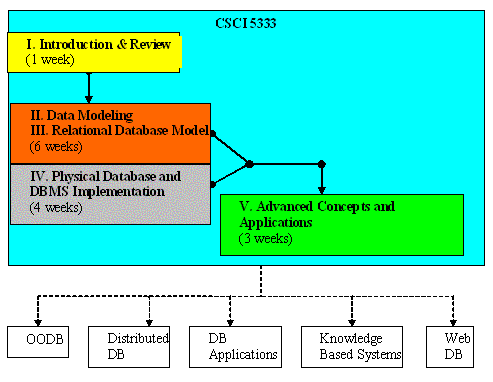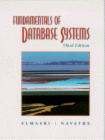CSCI 5333 DBMS
Fall 2004 (Aug. 23 - Dec. 4)
Time : Tuesdays
7-9:50pm
Classroom:
Delta 242
Prerequisite: This is an advanced database course.
Students taking this course are expected to have completed an
undergraduate database course, such as
CSCI 4333 Design of Database Systems.
If you have not completed an undergraduate database course,
please drop this course and take CSCI 4333 instead.
You are also
expected to be fluent in the basics of the SQL language.
Please talk to the instructor if you have any concern about the
pre-requisites.
Course Objectives: This
class covers advanced topics in database theories, including mainly
five modules:
- an overview of database systems,
- data modeling techniques,
- the relational database model, database languages,
functional dependencies and normalization,
- physical database & DBMS implementation (storage and
index structures, system catalog, query optimization, transaction
processing, concurrency control, database recovery, security &
authorization),
and
- advanced related topics.
The following diagram depicts the relationship among the five
modules. It also shows other database-related courses, of which
csci5333 serves
as the foundation.

Class
Format: Lectures are combined with discussions and, if
applicable,
student presentations and discussions of advanced topics.
Students
are expected to be active participants, by studying the relevant
chapters
and/or research papers and participating at the in-class discussion.
Required Text:

|
Elmasri
and Navathe, Fundamentals of Database Systems, 4th edition, Addison Wesley, 2004.
(ISBN#: 0-321-12226-7)
|
+ Instructor's handout in the class and/or on the Web
+ Selected research
papers:
A
relational model of data for large shared data banks
E. F. Codd
Communications of the ACM June 1970
Volume 13 Issue 6
Instructor:
|
Dr. T. A. Yang
|
|
(office) Delta 106
|
|
(phone#) (281)
283-3835 (Please leave a message if not available.)
NOTE: If the suite office is locked, you may use the
phone outside the office to call the extension 3835.
|
Emails without a subject line or signature will
be discarded.
Here is a sample subject line: "CSCI5132 project #1, question 1".
|
|
NOTE:
In addition, you are highly encouraged to send your questions to me by
e-mails (yang@uhcl.edu ).You, however, are responsible for
describing, in your email message, the problem(s) you have encountered,
the solution(s) you have tried, and the outcome you have got from these
solution(s).
|
Teaching
Assistant:
Banuprasad Samudrala
- Email: samudralab4407@uhcl.edu
Topics and
Notes
NOTE: The following schedule will be
followed as much as possible, although changes are probable.
Always check with your instructor if you are not sure what would
be covered next week.
Computer Labs
& Hours
Check
http://sce.uhcl.edu/computing.asp for lab information, open hours,
FAQs, etc.
| category |
percentage
|
| assignments |
15%
|
| projects |
25%
|
| tests |
24%
|
| final exam |
36%
|
NOTE: The accumulated points from all the categories determine a
person's final grade. There will be no extra-credit projects.
Grading Scale:
|
Percentile
|
Grade
|
|
93% or above
|
A
|
|
90% - 92%
|
A-
|
|
87% - 89%
|
B+
|
|
84% - 86%
|
B
|
|
80% - 83%
|
B-
|
|
77% - 79%
|
C+
|
|
74% - 76%
|
C
|
|
70% - 73%
|
C-
|
|
60%-69%
|
D
|
|
59% or below
|
F
|
Tests:
Both analytic and
synthetic abilities are emphasized. Being able to apply the learned
knowledge toward problem solving are also highly emphasized in the
tests.
Assignments and Late Penalty:
Assignments and
projects will be posted at the class web site. Assignments &
projects are due before the beginning of the class on the due day.
See Topics and Notes for the due
dates.
Points will be deducted from late assignments:
20% for the first 24 hours after the due time, 40% for the next 24
hours, 70% for the third 24 hours, and 100% after that. No extension
will be granted except for documented emergency. S tarting to work on the
assignments as early as possible is always the best strategy.
NOTE: Unless otherwise specified, all assignments and projects are
individual work. Students should take caution not to violate the
academic honesty policies. See
http://b3308-adm.uhcl.edu/PolicyProcedures/Policy.html for
details.
Assignments
Guidelines:
a.
Identification page: All assignments must have your name, and
course name/number/section number (e.g., CSCI5333-02 or CSCI5333-03) at
the top of the first page.
b. Proper stapling: Staple all the pages
together
at the top-left corner. NOTE: Do not use paper clips.
c. Order ! Order! Arrange the solutions following
the sequence of the questions. Write the question number at the
top-right corner of each page.
d. Word processing: It is required that you type
your reports (e.g., print them using a printer). Use a word processor
and appropriate typesetting and drawing tools to do the assignments. Spell-check
the whole document before printing it. You may loose points due to
spelling
or grammatical errors.
Projects:
The projects
will involve the design and implementation of database applications and
access methods. You may use JAVA or C++ as the programming
language. Each student in the class will have access to an Oracle
account.
Details of the projects will be later made available
at
Assignments & Projects .
Attendance Policy:
You are expected to
attend all classes. If you ever miss a class, it is your responsibility
to get
hold of whatever may have been discussed in the class.
Instructor's Notes:
- Unless due to unexpected,
documented emergency, no make-up exams will be given. No
make-up exams will be granted once the exams have been
corrected and returned to the class.
- Important: If you think you have lost some
points due to grading errors, make sure you approach the instructor within
a week after the assignment, project, or test is returned to you .
- To get the most out of this class, you
need to read the textbooks and spend time using computers regularly.
Be prepared for a class by preview the material to be covered in
that class
and participate in discussions and problem-solving exercises, if
applicable,
in the class.
- Due to the intensive nature
of graduate classes, 15-20 hours per week are expected of students in
studying the textbook/notes and working on the assignments, in addition
to class
attendance. Expect to spend more hours during
summer
sessions.
Go to the
Index
|
 Main Page Main Page
 Biography
Biography
 Teaching Teaching
 Research Research
 Services Services
 Other Links
Other Links
|
